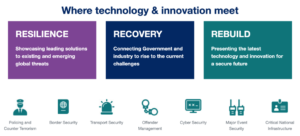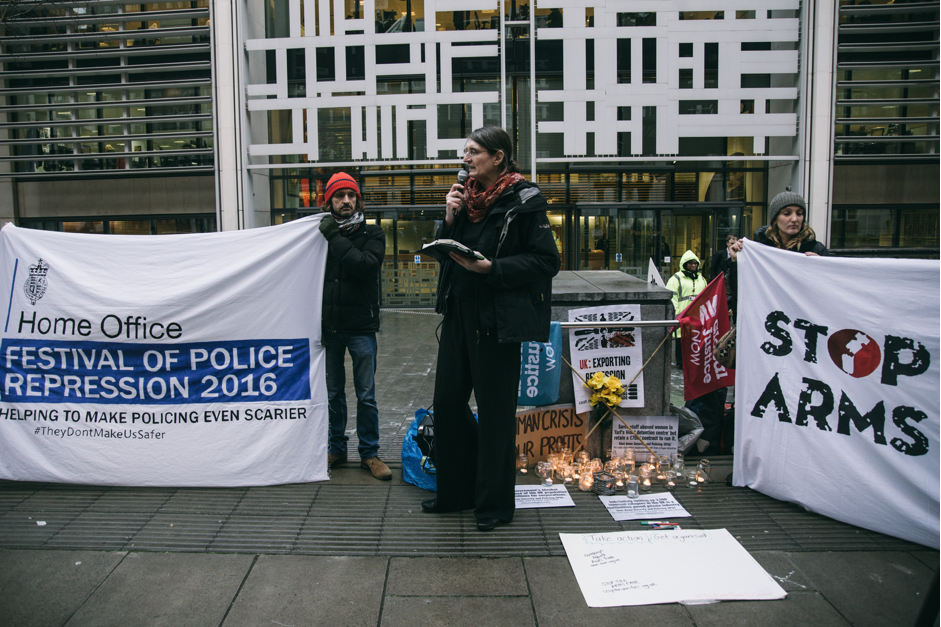Overview
The ongoing pandemic has brought to light what the UK government actually means when it talks about ‘protecting’ the nation and providing ‘security’.
Whilst Covid-19 deaths have now far exceeded the total number of UK civilians who were killed in WWII, the government plans to inject billions of pounds towards modernising Trident: Britain’s nuclear weapons delivery system. As the NHS continues to buckle under pressure on the frontline of the pandemic, Boris Johnson announced the biggest defence budget increase since the end of the Cold War; an announcement made just before it was confirmed that the government’s prioritised budget cuts to transition into the post-pandemic economy, is that of overseas aid. It is against this backdrop that the 2021 Security and Policing Home Office event (S&P), scheduled virtually between March 9-11, must be considered.
Resilience, Recovery, Rebuild?
The irony of the language used to market Security and Policing finally hit me as I was watching War Machine, the Netflix satire-cum-surprisingly-poignant-antiwar production, starring Brad Pitt as a proud American General intent on finally “winning” the war in Afghanistan. (The film, based on a true story, carries the telling logo: “We’re gonna liberate the sh** out of you.”)
In one scene, General Glen – also known as The Glenimal – is apologising to the father and brother of a little boy killed by American marines, and who had their house destroyed by an M203 grenade launcher. “I know the money that Sergeant Ortega gave you can’t bring your family back. But hopefully it can help you to rebuild” the General suggests. “Because rebuilding” he continues, after having just seen to the destruction of the man’s village, “is what we’re all about.”
The similarities with S&P are many and suggestive of the rhetoric accompanying contemporary security governance in general. The highly secretive event constitutes a central opportunity for the Home Office to bring together arms dealers, police services, government ministries and industry-focused academics, to boost the profitability and efficiency of security and policing. But, as the mindset demonstrated in War Machine so accurately reveals, recovering and rebuilding in this context refers to the act of recovering what was purposefully destroyed by the same interests that are now seeking to rebuild in such a way that the security provided is keeping political, military and industry interests safe – against the actual needs of the population.

Unsurprisingly then, when the S&P organisers talk about resilience, they are clearly not championing the resilience found in the determination of those populations who are the receivers of the technologies and knowledges marketed at the S&P. A resilience sprung from people’s will, not only to survive, but to live a full life in the context of (in)direct violence and destruction, policing and surveillance, securitisation and omnipresent suspicion. Instead, the S&P promotes the resilience of perpetual preparedness, of the ability of the state and capital – dependent on the adaptability of its citizenry – to painlessly ‘bounce back’ from the endless stream of challenges launched at the globalised nation-state.
Like in the context of any arms fair, the definition of “a secure future” carries with it a litany of disputed claims, and begs the question(s) of: Security for whom, by what means and at what cost? The answers can be found in the list of S&P participants, which confirms exactly what interests are vested in the UK government’s definition of resilience, recovery and rebuild.
‘It’s just good business’?
In 2020 the event exhibited products from the likes of key arms manufacturers such as Thales, Airbus, BAE Systems and Leonardo. These are all complicit in the Saudi-led Coalition’s war crimes in Yemen. What’s more, they export military materiel and services as well as border security technologies to repressive regimes including Pakistan, Algeria, Turkey, Indonesia, Gabon and Uganda. In turn, tear gas and CS grenades produced by Chemring have been used in situations such as police crackdowns on protesters in Egypt and Hong Kong, while the Israeli owned NSO Group has a record of hacking journalists, human rights activists and opposition politicians from India, Morocco, Spain, Rwanda and Togo.
Apart from the exhibitors, the international delegations invited by the government’s arms sales unit (DIT DSO) to visit S&P in 2020, are equally telling of what version of “a secure future” the Home Office endorses. The list of invitees included: Bahrain, Brunei, Israel, Qatar, UAE and Nigeria – all of which have a track record of political repression and police forces systematically using torture and excessive force. Here, another popular culture reference comes to mind, recalling Pirates of the Caribbean: At World’s End, a production that delivers, perhaps unwittingly, a pertinent demonstration of the ceaseless greed of the British Empire. Encircled by the flying remains of his ship, soon bombed into nothingness, Lord Cutler Beckett, head of the East India Company, whispers to the air with a glazed look: “It’s just good business.”
Why We Should Resist
In constant preparation of the crisis-to-come, we tend to create the space and momentum for the crisis ourselves. The feedback loop between the measures seeking to recover security, rebuild stability and foster resilience, and the states of insecurity they are allegedly responding to, has been firmly in place for a long time. It is no news today that militarisation does not make the world a safer place; except, of course, for the capital vested in its maintenance.
The lessons of the pandemic should thus be very different from the government’s current “good business” take on what constitutes “a secure future” for the UK. The complexity of how to emerge from a crisis that is as social and psychological as economic in nature, cannot be underestimated. In March this year, the public will once again be kept out from one of the key sites where the UK Government defines the meaning of security for the rest of the nation and beyond. What a way, indeed, to recover and rebuild what has been lost to the havoc of Covid-19. It is about time the UK Government started asking the British people themselves, what constitutes resilience to them.
If you would like to find out more about CAAT and support our work, you can sign up for campaign updates here and make a donation to our work here.
This is a guest blog: opinions of contributors do not necessarily reflect CAAT’s views.

